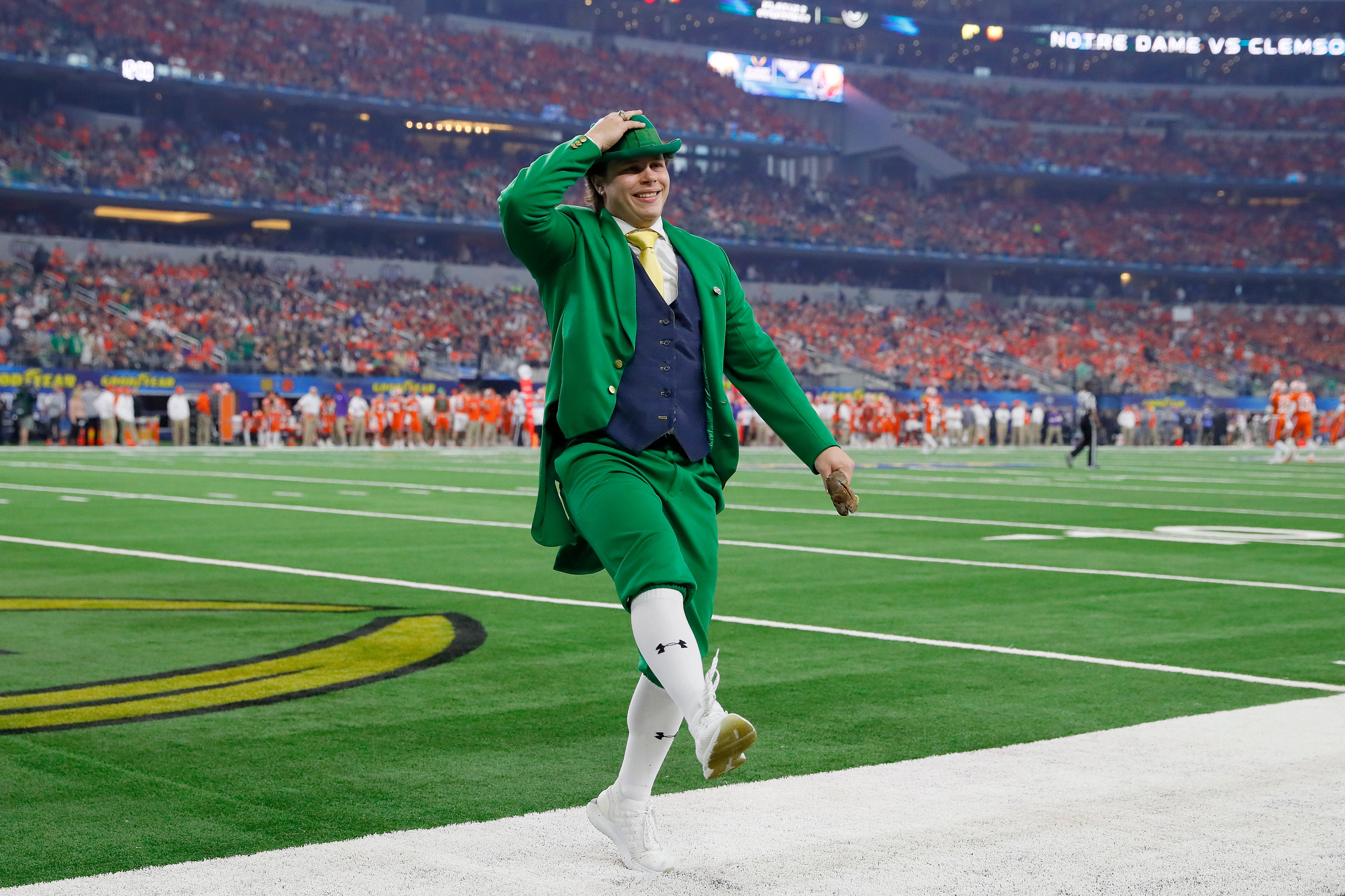Notre Dame on defence after survey lists leprechaun mascot as fourth most offensive
The school said there was no comparing its leprechaun mascot with the depictions of Native Americans other schools use as logos

Your support helps us to tell the story
From reproductive rights to climate change to Big Tech, The Independent is on the ground when the story is developing. Whether it's investigating the financials of Elon Musk's pro-Trump PAC or producing our latest documentary, 'The A Word', which shines a light on the American women fighting for reproductive rights, we know how important it is to parse out the facts from the messaging.
At such a critical moment in US history, we need reporters on the ground. Your donation allows us to keep sending journalists to speak to both sides of the story.
The Independent is trusted by Americans across the entire political spectrum. And unlike many other quality news outlets, we choose not to lock Americans out of our reporting and analysis with paywalls. We believe quality journalism should be available to everyone, paid for by those who can afford it.
Your support makes all the difference.Notre Dame is fighting for its Fighting Irish leprechaun mascot after the results of a survey found it to be the fourth-most offensive college football mascot in the US.
The top three offensive mascots wear facepaint and headdresses to appropriate the image of Native Americans, according to the survey.
The Indianapolis Star, a newspaper in Indianapolis, Indiana, sent the survey results to Notre Dame, prompting a response from the college defending its iconic mascot.
"It is worth noting ... that there is no comparison between Notre Dame’s nickname and mascot and the Indian and warrior names (and) mascots used by other institutions such as the NFL team formerly known as the Redskins," the statement read. "None of these institutions were founded or named by Native Americans who sought to highlight their heritage by using names and symbols associated with their people."
The college explained that the Irish have been a central part of the university's history and were integral to selecting the name of the mascot.
"Our symbols stand as celebratory representations of a genuine Irish heritage at Notre Dame," the university said, "a heritage that we regard with respect, loyalty and affection."
According to Notre Dame, the Fighting Irish nickname was originally a derogatory name other schools used to mock the university's athletic team.
The derision was rooted in anti-Catholic and anti-immigrant sentiment. During one game in 1899, students from Northwestern changed "Kill the fighting Irish”, the university claims.
Eventually the school embraced the name and incorporated it into its identity. The name became official in 1927 when Father Matthew Walsh, whose family were Irish immigrants, adopted the name.
The school also claimed that the leprechaun was an intentional caricature adopted to harken to the school's Irish heritage. The leprechaun was historically used by the English to mock the Irish, and just as with the name, the school incorporated the mascot as a way to disarm its detractors.
"In both the upraised fists of the leprechaun mascot and the use of the word 'fighting,' the intent is to recognize the determination of the Irish people and, symbolically, the university’s athletes," the university said.
This is not the first time the leprechaun has faced blowback. In a 2018 piece for The Wall Street Journal, ESPN's Max Kellerman argued that the mascot should be retired and replaced.
"Many Irish-Americans are not offended, but many are," he argued. "Should that also change? The answer is yes. Unequivocally yes. Pernicious, negative stereotypes of marginalized people that offend, even some among them, should be changed."
Mr Kellerman's classification of Irish-Americans as a "marginalised people" is curious, as most people of Irish descent in the US are simply considered white, much like Americans with Italian, Polish or other European ancestries.
The survey was a product of the Quality Logo Products company, which prints logos on T-shirts and other items.
The company decided to conduct the survey ahead of the college football season, asking respondents their views on 128 Division 1 football mascots. The respondents were asked to score them based on various categories, including the best and worst to the creepiest and most offensive.
Florida State, San Diego State, and the University of Hawaii were ranked as the top three most offensive, as each school incorporates a Native American as its mascot.
Join our commenting forum
Join thought-provoking conversations, follow other Independent readers and see their replies
Comments